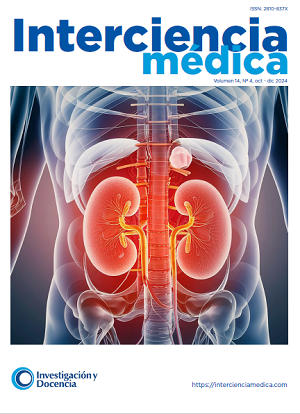Impact of sodium hyaluronate use in patientswith interstitial cystitis /painful bladder syndrome
DOI:
https://doi.org/10.56838/icmed.v14i4.224Keywords:
interstitial cystitis, painful bladder syndrome, sodium hyaluronate, intravesical treatment, pelvic painAbstract
Objetive: To evaluate the efficacy and safety of sodium hyaluronate in patients with interstitial cystitis/painful bladder
syndrome (IC/PBS). Methodology: A prospective, observational, and descriptive study was conducted with 20 patients
diagnosed with IC/PBS, treated with intravesical instillations of sodium hyaluronate (40 mg/50 ml) weekly for the first month
and monthly for two additional months. Symptoms and quality of life were assessed using the BPIC-SS questionnaire before
and after treatment. Results: A significant reduction in symptoms was observed after treatment, with a 60.71% improvement
in BPIC-SS scores. Patients reported notable reductions in pain, urgency, and urinary frequency. No severe adverse effects
were reported, indicating the safety and tolerability of sodium hyaluronate. Discussion: Sodium hyaluronate was effective
in reducing urinary symptoms and pelvic pain in patients with IC/PBS. Its mechanism of action may be related to restoring
the glycosaminoglycan layer, improving bladder barrier function. Despite positive results, treatment should be personalized
based on individual patient characteristics. Conclusions: Sodium hyaluronate is a safe and effective option for treating IC/
PBS, significantly improving symptoms and patients' quality of life. Long-term studies are needed to evaluate the durability
of its effects.
Downloads
Downloads
Published
Issue
Section
License
Copyright (c) 2024 Emperatriz E. Centeno Martinez, Manuel Lobsang Delgado-Pacheco, Boris Miltom Cachay-Tello, Rubén Gonzalo Duin-Ortiz

This work is licensed under a Creative Commons Attribution 4.0 International License.














